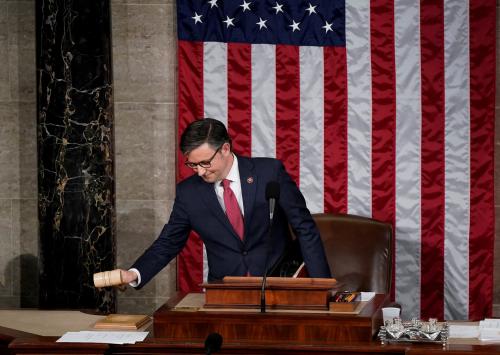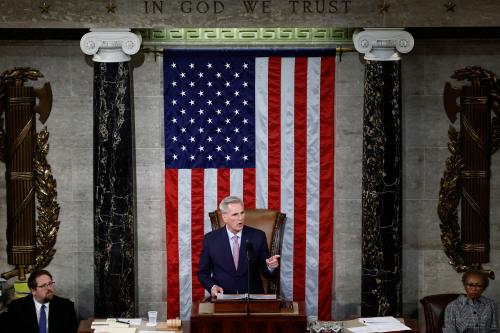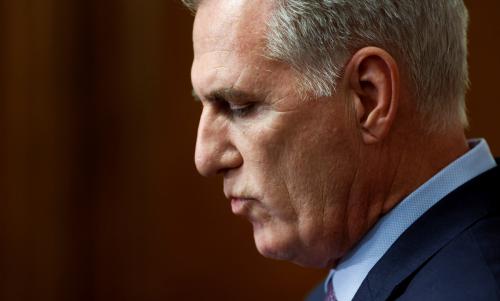Rep. Mike Johnson (R-La.) has served just six years in the House of Representatives before being elected as the new speaker of the House. Molly Reynolds explains how his relative inexperience could hurt or help, especially in upcoming negotiations to avert a government shutdown in November.
TRANSCRIPT
PITA: Twenty-two days after former Speaker of the House of Representatives Kevin McCarthy was ousted by his own party, after multiple rounds of voting for a multitude of potential leadership candidates, House Republicans finally coalesced around Representative Mike Johnson of Louisiana, electing him as the new speaker.
With us today is Molly Reynolds, a senior fellow in Governance Studies here at Brookings. And we’re going to talk a little bit about who is Representative Mike Johnson and what his leadership might mean for the business of the House, including the upcoming government shutdown. Molly, thanks for talking to us.
REYNOLDS: Thanks for having me.
PITA: So, Representative Johnson was elected in 2016, so he’s served just six years in Congress. Not as much of a household name. So, what can you tell us a little bit about who he is and how he wound up rising to the head of leadership, being second in line for the presidency?
REYNOLDS: Sure. So he is, as you know, relatively new to the House, at least by sort of speaker of the House standards. He will be sort of the most junior speaker of the House in quite some time. He has been sort of in a lower level of the House Republican leadership for the last sort of term and a half. Until he became speaker, this is his second term as the vice chair of the House Republican Conference, which is sort of a lower-level elected leadership position. He spent one term before that as the head of the Republican Study Committee, which is a group of sort of relatively conservative members of the House Republican Conference. I think that’s one important thing to know about him, which is that he is quite conservative and, particularly socially so. His own background comes from a career as a lawyer defending religious freedom cases, that sort of thing. So he comes from that kind of social conservative wing of the conference.
As for how did he get here, he is, as you indicated, or was, not the first choice to replace Kevin McCarthy. The Republican conference went through basically three other – they called them speaker-designates. So three other folks who had gotten a majority of the votes within the conference itself, but either failed to get the necessary 217 votes on the floor in the case of Jim Jordan, or in the case of Steve Scalise and Tom Emmer, both of whom who had gotten a majority in the conference, pulled out before they actually took it to a floor vote with the acknowledgement they were unlikely to succeed on the floor.
PITA: Talking about his relative inexperience in the House, Washington Post senior congressional reporter Paul Kane had a little bit of commentary about relative youth, talking about how Nancy Pelosi had been 20 years in the House, and how even Paul Ryan, who was also a relatively younger speaker, had served 16 years in the House, including chairing the very crucial Budget Committee and the Ways and Means Committee. How could Johnson’s relative inexperience affect his job as speaker?
REYNOLDS: So, I think this can cut two possible ways. The one way is that he is quite inexperienced. He’s been relatively active as a legislator in terms of he does have some bills that have moved through the chamber, which is not something you can say for every member. They’ve been largely partisan bills; they have not been ones that have attracted a lot of Democratic co-sponsors. But he has demonstrated some interest in moving legislation, but doesn’t really have any experience engaging in sort of the big cross-party, cross-chamber, frankly, cross-institution – so, with the White House — negotiations that have come to characterize so much of the contemporary legislative process. And so, yes, Paul Ryan was relatively young in years when he became speaker, but as you noted, did have both a lot of experience in the House itself and relatively shortly before he was kind of drafted into service as speaker in the fall of 2015, had negotiated a pretty significant legislative package with Patty Murray, a Democratic senator from Washington. And so already had that experience of going into negotiating a big package. And so, Johnson doesn’t have that.
And on one hand, that’s notable. I mean, negotiating big packages is a skill. It matters whether you know the other players involved. There was a sort of semi-viral post on X/Twitter yesterday where Susan Collins was asked – who is the top Republican on the Senate Appropriations Committee – was asked what she thought of Mike Johnson. And she said that she didn’t know him. She was gonna have to Google him. And so, the fact that, you know, he is not necessarily known to a lot of players, that may matter. We do have this question of trust and repeated play and really just kind of knowing where the levers are. On the other side of the coin though, is the possibility that because he is a newer face, because he doesn’t have all of the kind of commitments both positively and that people feel like he reneged o,n that Kevin McCarthy, for example, had. It may well be the case that he has a little bit more flexibility to negotiate than McCarthy did or that some of the other folks who were put forward as speaker candidates might have. It’s very difficult to know.
PITA: How much does it matter in terms of some of the more arcane procedural factors of the House? Is that something that can basically be handled by the professional staff who know how all this works or could that matter for him particularly?
REYNOLDS: Yeah, so we will see whether he chooses to keep around many of the folks like the clerk of the House and some of those folks who are appointed by the speaker but are kind of longtime professional experts. But the question of staffing is a good one, and one thing that I don’t think we know yet is what his staff as speaker will look like. He obviously has a staff in his personal office from his congressional district in Louisiana, but many of those folks are not especially long tenured on the Hill, they’re not necessarily the kind of folks who you would think would come up with a new speaker. And so, one of the things that I’ll be watching pretty closely in the next couple of weeks is sort of how does he staff up the office? Does he keep any of the folks who worked for McCarthy, does he take on other former House Republican leadership staffers? We’ll see.
I think it’ll also be really interesting to watch how powerful do other members of the House Republican leadership become. So, we sort of live in this era where we think of the speaker as very powerful and holding a lot of centralized influence in the house. But that’s not the only model for governing that can work, both in terms of devolving more power to committees and to rank and file members, but even just sharing power in different ways across members of the House Republican leadership team. So, in the sort of Denny Hastert, Tom DeLay years, Tom DeLay as majority leader was quite powerful. And so we might well see sort of more of that kind of arrangement with with Steve Scalise, I don’t know, but those are the kinds of things I’ll be paying attention to.
PITA: So, in terms of him needing to staff up, there are two fairly short-term priorities coming up. One is the last continuing resolution running out in sort of early mid-November, and of course spending packages for Ukraine and now potentially for Israel as well. Do we have any inklings yet about either his personal inclinations are leading or what his leadership style may mean for those priorities?
REYNOLDS: So, the current continuing resolutions, the current temporary measure funding the government runs through the middle of November. He has said that he would prefer at that point to try and adopt another continuing resolution that runs into January or as perhaps as long as April because many in the House Republican Conference are concerned about the prospects of the House getting what we would call jammed by the Senate, which is to say that as say the holidays approach, the Senate might pass something that takes care of all of the outstanding government spending bills for the rest of the fiscal year and then sort of dares the House to take it or leave it, risking a shutdown if they choose to leave it. Many people in the House Republican Conference really don’t want this outcome. They think it’s a recipe for higher spending levels than they are interested in. And so I think Johnson and many of his allies in the House Republican Conference would like to try to prevent that outcome. Obviously, they can’t prevent that outcome unilaterally. They’d have to get the Senate to agree to that approach as well. So, we will see what happens. On the question of supplemental funding for Ukraine and Israel, so the Biden administration has put forth a proposal that would provide some additional funding for both of those conflicts, as well as for some additional spending in the Indo-Pacific region, some spending on the border. That package could move along with a measure keeping the government open. It could move separately. I think this question, particularly about the future of U.S. aid to Ukraine, is a really live one. We’ve seen sort of over time, House Republicans become less and less supportive of providing additional security assistance to Ukraine. And so, we’ll see kind of where Johnson falls on that in the coming weeks.
PITA: So, it used to be considered something of a hallmark of Republican legislative maneuvering that ultimately no matter how much internal wrangling went on, they would all vote together ultimately in lockstep. And it always seemed like it was kind of the Democrats who were you couldn’t get it together, too fractious. And now it’s that’s been something of a switch and it’s the Republican House that has all these internal fractures. If Kevin McCarthy, who himself voted against certifying President Biden’s electoral win, was ultimately deemed too much of an institutionalist for this most hardline contingent of the Republican House membership, the so-called chaos caucus, could Johnson ultimately wind up in a similar position? Because he’s responsible for the business now, puts him in that spot.
REYNOLDS: Yeah, it’s a good question. And one other thing that I should have mentioned earlier about Johnson and his background that you reminded me of right there is that he was, in the period between the 2020 election and January 6, 2021, he was involved particularly from sort of a legal perspective in some of the efforts to try and throw out the results of the 2020 election. And so that is, as we think about — and you’re absolutely right that McCarthy also voted that way on the 6th — but it’s important to sort of think about that too as we think about who the new speaker of the House is. One way to interpret the question you just asked is, does this solve any of the Republicans underlying political problems? And I think fundamentally, no. There are still these divisions within the House Republican Conference. They still have an extremely narrow majority. They still have don’t have a lot of room to maneuver. The Senate is still controlled by Democrats. There’s still a Democratic president in the White House. All of those mechanics are still the same. The big question for me is, again, whether Johnson, because he doesn’t have the same sort of baggage and history with different factions, whether because he is sort of from the right end of the conference and thus, those folks may trust him more, is he given more running room to cut the kind of deals that are ultimately necessary given divided government and narrow majorities than McCarthy was, or some of the folks like Scalise or Emmer, who are kind of more identified as what passes for establishment Republicans in the House Republican Conference. Is Johnson given more latitude to cut deals, or is he ultimately just back in the same place that McCarthy was with some share of the conference unwilling to go along with his plans, and more importantly, with proposals that could also clear the Senate and would also be signed by Joe Biden?
PITA: Lastly, given as you just mentioned, Johnson’s role as being a supporter of President Trump’s denial of the 2020 election results, what are some of the concerns for what this could mean for the 2024 elections if he’s still the speaker of the House in that circumstance?
REYNOLDS: Yeah, so I’ll say sort of two things. One is that in the aftermath of the January 6, 2021 insurrection, one of the sort of most positive developments that came after that was reform passed through Congress and signed by the president that made some changes to the Electoral Count Act, which is the 19th century law that governs exactly how the electoral ballots are opened and tabulated on January 6th, such that it is now potentially harder to raise objections to particular states’ slates of electors, and so that stands to address one of the proximate factors that led to January 6, that made the procedural maneuvering that was part of that day possible.
I think in a broader sense, we do have this question of whether and how the turmoil in the Republican conference over the past several weeks might or might not matter for the 2024 elections. And I think it is certainly true that, you know, one of the issues on which Johnson himself has been most active is on kind of anti-choice questions as a social conservative. It is also true that Democrats have had a lot of electoral success since the Dobbs decision, sort of painting Republicans as very extreme on abortion and really wanting to restrict the reproductive healthcare choices of women. And so, I think having someone like Johnson, who’s a pretty significant social conservative as the congressional standard bearer of the Republican Party, I think we’ll see that come up a lot in in the 2024 congressional campaigns. But at the end of the day, we know that more and more people vote on a party line basis for a presidential candidate of the same party that they vote for House and Senate candidates. And so a lot of what will happen in 2024 electorally is going to end up being about sort of is it a Biden versus Trump rematch? How popular is President Biden at that point? How unpopular is President Trump? All those sorts of dynamics. And so from a governing perspective, the current and continuing dysfunction in the House Republican Conference is a real obstacle to the U.S. Congress fulfilling some of its basic responsibilities. What it will mean electorally, I think, is less clear.
PITA: All right. Molly, thanks very much for talking to us today.
REYNOLDS: Thanks for having me.
The Brookings Institution is committed to quality, independence, and impact.
We are supported by a diverse array of funders. In line with our values and policies, each Brookings publication represents the sole views of its author(s).








Commentary
PodcastWho is new Speaker of the House Mike Johnson?
October 26, 2023
Listen on
The Current Podcast